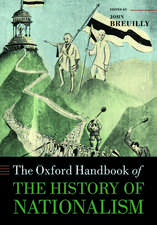Nationalism and the State
Autor John Breuillyen Limba Engleză Paperback – 30 noi 1993
Since its publication this important study has become established as a central work on the vast and contested subject of modern nationalism. Placing historical evidence within a general theoretical framework, John Breuilly argues that nationalism should be understood as a form of politics that arises in opposition to the modern state. In this updated and revised edition, he extends his analysis to the most recent developments in central Europe and the former Soviet Union. He also addresses the current debates over the meaning of nationalism and their implications for his position.
Breuilly challenges the conventional view that nationalism emerges from a sense of cultural identity. Rather, he shows how elites, social groups, and foreign governments use nationalist appeals to mobilize popular support against the state. Nationalism, then, is a means of creating a sense of identity. This provocative argument is supported with a wide-ranging analysis of pertinent examples—national opposition in early modern Europe; the unification movement in Germany, Italy, and Poland; separatism under the Hapsburg and Ottoman empires; fascism in Germany, Italy, and Romania; post-war anti-colonialism and the nationalist resurgence following the breakdown of Soviet power.
Still the most comprehensive and systematic historical comparison of nationalist politics, Nationalism and the State is an indispensable book for anyone seeking to understand modern politics.
Breuilly challenges the conventional view that nationalism emerges from a sense of cultural identity. Rather, he shows how elites, social groups, and foreign governments use nationalist appeals to mobilize popular support against the state. Nationalism, then, is a means of creating a sense of identity. This provocative argument is supported with a wide-ranging analysis of pertinent examples—national opposition in early modern Europe; the unification movement in Germany, Italy, and Poland; separatism under the Hapsburg and Ottoman empires; fascism in Germany, Italy, and Romania; post-war anti-colonialism and the nationalist resurgence following the breakdown of Soviet power.
Still the most comprehensive and systematic historical comparison of nationalist politics, Nationalism and the State is an indispensable book for anyone seeking to understand modern politics.
| Toate formatele și edițiile | Preț | Express |
|---|---|---|
| Paperback (2) | 159.01 lei 3-5 săpt. | +28.01 lei 5-11 zile |
| MANCHESTER UNIVERSITY PRESS – 25 noi 1993 | 159.01 lei 3-5 săpt. | +28.01 lei 5-11 zile |
| University of Chicago Press – 30 noi 1993 | 423.86 lei 6-8 săpt. |
Preț: 423.86 lei
Nou
Puncte Express: 636
Preț estimativ în valută:
81.10€ • 84.91$ • 67.11£
81.10€ • 84.91$ • 67.11£
Carte tipărită la comandă
Livrare economică 07-21 aprilie
Preluare comenzi: 021 569.72.76
Specificații
ISBN-13: 9780226074146
ISBN-10: 0226074145
Pagini: 482
Dimensiuni: 159 x 235 x 30 mm
Greutate: 0.65 kg
Ediția:1
Editura: University of Chicago Press
Colecția University of Chicago Press
ISBN-10: 0226074145
Pagini: 482
Dimensiuni: 159 x 235 x 30 mm
Greutate: 0.65 kg
Ediția:1
Editura: University of Chicago Press
Colecția University of Chicago Press
Notă biografică
John Breuilly is senior lecturer in history at the University of Manchester.
Cuprins
Preface to the first edition
Preface to the second edition
Introduction
Pt. I: Social and intellectual bases of nationalism
1: Social bases of nationalist politics
2: Sources and forms of nationalist ideology
Pt. II: Varieties of nationalism (i) In a world without nation-states
3: Prelude to nationalism: religious and national oppositions in early modern Europe
4: Unification nationalism in nineteenth-century Europe
5: Separatist nationalism in nineteenth-century Europe
6: Separatist nationalism in the Arabworld
7: Approaches to anti-colonial nationalism
8: Anti-colonial nationalism: two case studies
9: Sub-nationalism in colonial states
10: The colonial state and nationalism
11: Reform nationalism outside Europe
Pt. III: Varieties of nationalism (ii) In a world of nation-states
12: Separatist nationalism in the new nation-states
13: Nation-building and nationalism in the new states
14: Unification nationalism and the new nation-states
15: Reform nationalism in the old nation-states
16: Separatist nationalism in the developed nation-states
17: Nationalism in contemporary east-central Europe
Conclusion
Appendix: Approaches to nationalism
Chronologies for the major case studies
Bibliographical essay
Index
Preface to the second edition
Introduction
Pt. I: Social and intellectual bases of nationalism
1: Social bases of nationalist politics
2: Sources and forms of nationalist ideology
Pt. II: Varieties of nationalism (i) In a world without nation-states
3: Prelude to nationalism: religious and national oppositions in early modern Europe
4: Unification nationalism in nineteenth-century Europe
5: Separatist nationalism in nineteenth-century Europe
6: Separatist nationalism in the Arabworld
7: Approaches to anti-colonial nationalism
8: Anti-colonial nationalism: two case studies
9: Sub-nationalism in colonial states
10: The colonial state and nationalism
11: Reform nationalism outside Europe
Pt. III: Varieties of nationalism (ii) In a world of nation-states
12: Separatist nationalism in the new nation-states
13: Nation-building and nationalism in the new states
14: Unification nationalism and the new nation-states
15: Reform nationalism in the old nation-states
16: Separatist nationalism in the developed nation-states
17: Nationalism in contemporary east-central Europe
Conclusion
Appendix: Approaches to nationalism
Chronologies for the major case studies
Bibliographical essay
Index
Descriere
Descriere de la o altă ediție sau format:
Combining historical perspective and theoretical analysis, this book provides an overview of modern nationalism. The text explores the recent developments in eastern and central Europe that have given the subject of nationalism a new significance.
Combining historical perspective and theoretical analysis, this book provides an overview of modern nationalism. The text explores the recent developments in eastern and central Europe that have given the subject of nationalism a new significance.





















